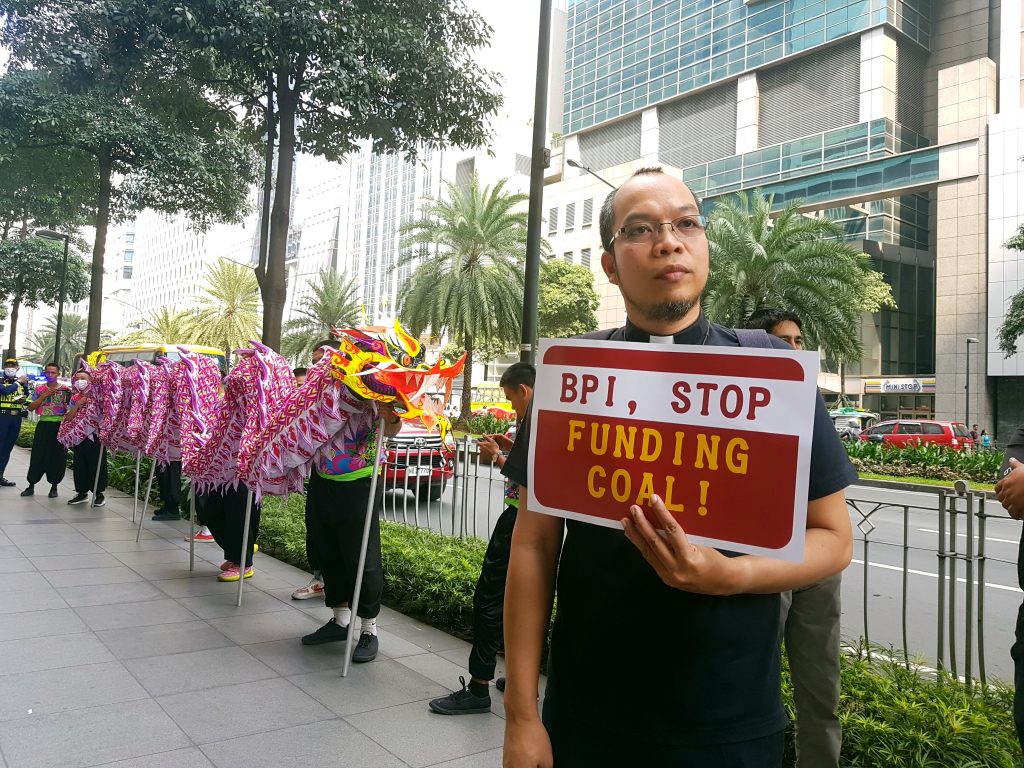
Church and civil society leaders challenged the Bank of Philippine Islands (BPI) to “step up” its clean energy ambitions and withdraw from coal sooner than 2033.
On August 2, BPI president Teodoro Limcaoco told reporters that the bank is “reducing our coal financing in our portfolio by half by 2026 and to zero by 2037 if not earlier.”
He said the bank is hoping to completely halt all coal plant financing to zero as early as 2033.
“That is a commitment that we are making to help create a cleaner, more livable environment for generations to come,” he said.
BPI has been supporting at least 15 coal power projects and has six coal developing companies among its clientele.
Bishop Jose Colin Bagaforo of Caritas Philippines said multi-national and multi-billion finance institutions like BPI “have the absorptive capacity to halt coal financing sooner than 2033.”
“I’m sure they have been able to foresee climate change and the need to transition to renewable energy mix way before,” said the prelate.
Bishop Bagaforo said his organization is “grateful of the continuing positive responses” of the bank to the demands for coal divestment, “however, I see these actions wanting.”
The prelate urged BPI “to be more proactive” and “work closely with civil society to determine efficient ways to provide peripheral communities better access to affordable energy solutions.”
BPI is number 1 among the 15 banks identified to have been providing financial support to the coal industry in the last decade, according to the group Withdraw from Coal (WFC) Coalition.

Bishop Gerardo Alminaza of San Carlos, co-convenor of WFC, welcomed the announcement of BPI saying that it is “a good indication of the direction [it] intends to take.”
“We hope BPI would continue on this path by ensuring its energy investments are fully channeled to the development of renewables instead of any other destructive source,” he said.
Some 45 percent of the bank’s power generation loan portfolio is dedicated to renewable energy, while the other 45 percent is for coal projects, and 10 percent for fossil gas projects.
Gerry Arances, executive director of the Center for Energy, Ecology, and Development, said BPI needs to do more in order to assist the country towards sustainability.
“BPI is exhibiting the potential to aid the country in carving its way out of dependence from coal, but we are concerned that it is setting the bar low with little clarity in just how much coal it still intends to support for well over a decade,” said Arances.
Arances said the bank is “still generously giving itself space to keep financing coal developers and projects, and mixed signals from the country’s top coal bank do little for the Philippines’ low carbon transition.”
In April, WFC called the attention of BPI after it approved a new commitment to underwrite over P1 billion of a coal project proponent’s new corporate retail bond that was utilized to fund three coal-fired power plants.
“We urge BPI to integrate both direct and indirect financing, including underwriting and corporate finance, in coming up with more stringent restriction policies and coal exit plans that respect the country’s aim to peak its emissions by 2030 or even earlier,” said Arances.
Rodne Galicha of Living Laudato Si Philippines said Philippine banks that are financing dirty energy sources must be reminded that the earth is facing a climate emergency.
“The entire human family and all of God’s Creation cannot wait until 2033. Concrete ecological actions must be done now and these banks must completely walk away from destructive projects as soon as possible,” he said.
The Philippines relies on coal-fired power plants for 58 percent of its energy requirements while 21 percent comes from renewable energy sources, the same as the ratio for fossil gas.






0 Comments